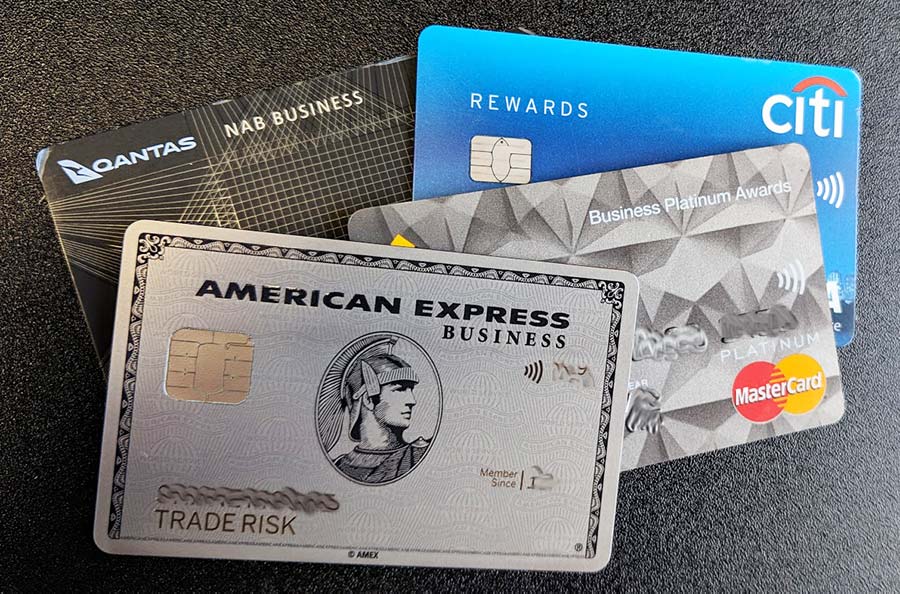If you’re spending tens of thousands on materials and equipment each year, and even tax payments, you’re missing out if you don’t have the right credit card.
Now before I go any further, I need to stress that this article is NOT financial advice! We deal in insurance services, not finance or credit cards.
What this article is, is a basic guide based on my experience of maximising our points earning via credit cards here at Trade Risk. It is based purely on my own experience, does not take into account any of your needs and objectives and should not be relied upon.
Now that we have the formalities out of the way, it’s back to the good stuff…
So if you run a trades business, there is a good chance you’re spending tens of thousands (or hundreds of thousands) on business expenses every year.
If you use the right credit cards in the right way, you could be earning yourself hundreds of thousands of points every year, that could be going towards flights, holidays or all sorts of other rewards.

I’m going to run through the process I used as the owner here at Trade Risk to maximise our points from business expenses.
Is this even right for you?
Before you get too involved in this, the first step is to consider whether chasing points is really the right thing for your trade business.
Credit cards can be a great way to manage cash flow in your business, but that only works effectively when you’re paying the full balance each month to take advantage of the interest free period.
Cards that earn points often have higher fees and sometimes higher interest, so if you are carrying a balance from month to month and copping interest, you should probably forget about points and just find the card with the lowest interest rate.
If you do clear your balance each month, then you can start to forget about the interest rate and just consider the annual fee (if any) and the points earning potential.
Check your earn rates
Not all credit card awards points programs are the same, and not all awards programs pay the same number of points for all transactions.
So the next step is to complete an audit of which cards you currently have and what points they are paying, if any…

One of the cards I use at Trade Risk is the AMEX Business Platinum. It gives me a different number of points for various types of payments. For example payments for insurance premium give quite a low earn, whilst payments at supermarkets give a good earn.
So in my audit I identified that paying for our business insurance on my AMEX was not a good idea, but using it at the supermarket when buying office supplies was a good idea.
Another card I use is the CBA Business Platinum MasterCard. It works out best for payments to the ATO, so I only use that card for ATO payments.
On that point, payments to the ATO are a tricky area, so I’ll cover that in more detail in a dedicated section later in this article.
Essentially what you’re doing here is working out which card you should use for the different types of payments in your business, therefore maximising your earning potential.
Another area that must be considered during the audit process is the points earning caps that some cards have. Our CBA card has a cap, so I avoid using it for anything that isn’t getting the best earn rate from it.
Surcharges on your different card types also needs to be considered. For example, an AMEX will often have the highest earn rate, but will also typically attract the highest surcharge.
So you need to weigh up both sides. You might be better to use another card that earns less points if the surcharge is proportionally less.
I know this all sounds quite complex, but it only took a few hours once I got stuck into it, and the extra points earning makes it well worth it.
ATO Payments
No one likes making payments to the ATO, but if you run a decent business, some of your chunkiest payments each quarter (or month) will be to the ATO.
In years gone by there were plenty of different credit cards that would give you points for payment to the ATO, but many have dropped off.
One card that still offers points is the CBA Business Platinum Mastercard. It’s important to use the business version of this card, as the personal version will not give you points for ATO payments.
Using a credit card to pay the ATO will cost you more thanks to the credit card surcharge. At the date of writing this article (2/01/2019) the surcharges are as follows:
- AMEX: 1.45%
- Visa: 0.78%
- MasterCard: 0.70%
Although the percentage is tiny, it can still add up if you’re making large payments, so you need to consider if the surcharge is worth the points that you’ll earn.
A fantastic guide on earning points from ATO payments can be found here on the Point Hacks website.
Tax Implications
This is a tricky area, so I’m not going to go into any great detail other than to raise it as an issue.
The question here is whether or not the credit card surcharges you’re paying in order to chase the rewards points are tax deductible. Whether or not they are could have an impact on if this whole thing is worthwhile.
You should really speak with your accountant for further information on this one, but here’s what I’ve been told from various sources:
If you’re paying for business expenses on your credit card purely for person gain (i.e. credit card points that will benefit you personally) then it’s very questionable whether the surcharges are a legitimate business expense, and therefore tax deductible.
But if you’re paying on credit cards for genuine business reasons (i.e. to manage your cash flow more effectively) and your business is benefiting, then they could well be a genuine business expense and therefore tax deductible.
Again, this is really something you should speak with your accountant about, but I just wanted to raise it as something you need to consider.
Is it all worth bothering with?
Of course you have better things to worry about in your trade business than earning credit card or frequent flyer points.
But if you’re potentially leaving tens or hundreds of thousands of frequent flyer points on the table, and you could change that by spending a few hours getting on top of it, then it’s certainly worth thinking about.
Personally I do think it’s worthwhile, especially if your business has reached a size where you’re spending tens of thousands each month on business expenses.
Advice warning…
I know I’ve already mentioned this, but again, this article is not advice! Neither I nor Trade Risk are qualified or licenced to provide advice on credit cards or taxation. The articles takes into account none of your personal (or business) needs or objectives, and should not be relied upon in any way. You should do your own research and speak with suitably qualified professionals before taking any action. The article is based purely on my personal experience and may or may not be correct.

.



